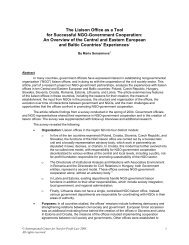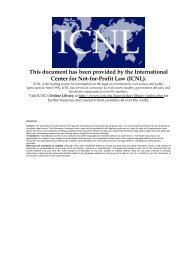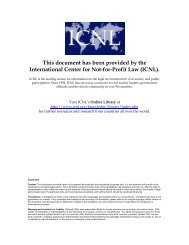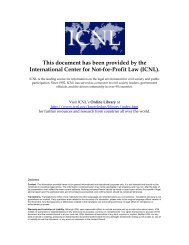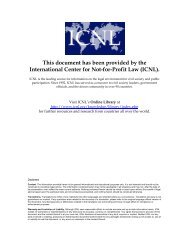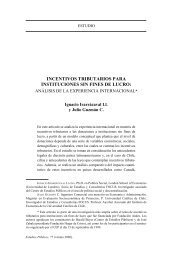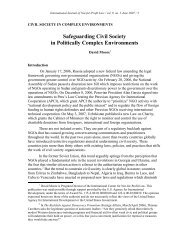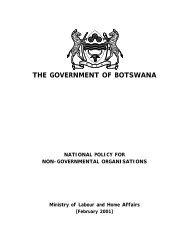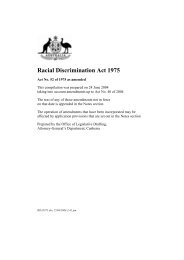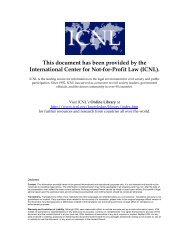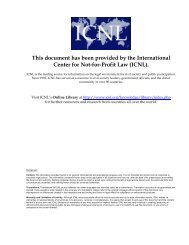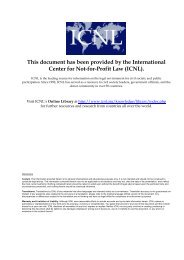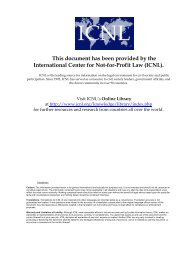Jordan - NGO Law Monitor - Research Center - ICNL - The ...
Jordan - NGO Law Monitor - Research Center - ICNL - The ...
Jordan - NGO Law Monitor - Research Center - ICNL - The ...
Create successful ePaper yourself
Turn your PDF publications into a flip-book with our unique Google optimized e-Paper software.
<strong>Jordan</strong> - <strong>NGO</strong> <strong>Law</strong> <strong>Monitor</strong> - <strong>Research</strong> <strong>Center</strong> - <strong>ICNL</strong><br />
that meets its membership criteria, which are specified within its articles of incorporation. Societies may<br />
benefit from income tax exemptions and charitable status.<br />
Closed Society: A closed society is a society of one or more member(s) where its financial resources are<br />
limited to the funds/money paid by the founding members to achieve its objectives. Closed societies are<br />
registered at the Ministry of Social Development, and require the approval of the Council of Ministers to be<br />
registered. Closed Societies are supervised by the competent ministry to which the society’s objectives are<br />
related.<br />
Private Society: A private society is a society with a limited number of members, which should not be less<br />
than three and not more than twenty. Private societies are registered at the Ministry of Social Development,<br />
and are also supervised by the competent ministry to which the society’s objectives are related. If the<br />
membership of a Private Society is limited to one legal person, approval of the Council of Ministers is<br />
required. Private Societies do not have an open membership scheme, and were formerly known as not-forprofit<br />
companies.<br />
Foreign Societies: <strong>Law</strong> 51 of 2008 and its amendments allow the registration of operating branches of foreign<br />
societies. <strong>The</strong> registration of branches of foreign societies is handled by the Ministry of Social Development.<br />
According to the 2008 law, both Societies and Private Societies are eligible to receive local and foreign<br />
funding, and support from the Fund for the Support of Societies. Closed societies are prohibited from seeking<br />
any kind of funding other than the money put by the members, and foreign societies may not seek local<br />
funding without the prior approval of the Council of Ministers.<br />
Public Benefit Status<br />
<strong>The</strong> Income Tax <strong>Law</strong> (<strong>Law</strong> 75 of 1985) exempts the income of societies and other social entities from tax; it<br />
also exempts the income of any religious, charitable, cultural, and educational, sports, and health<br />
organizations with public benefit purposes. Societies apply to the Income Tax Department requesting<br />
recognition for tax-exempt status; the Department verifies whether the eligibility criteria stated in Article 7 of<br />
the Income Tax <strong>Law</strong> has been met by the applicant, and issues a decision to that effect.<br />
In addition, the Income Tax <strong>Law</strong> grants certain societies charitable status. Societies with religious, charitable,<br />
humanitarian, scientific, cultural, sports, or professional purposes are eligible to apply for charitable status.<br />
Donations made to societies with charitable status are exempted from income tax; the exempted income,<br />
however, should not exceed one quarter of the taxable income of the donor. For the society to benefit from<br />
charitable status, a request should be submitted to the Council of Ministers requesting recognition of the<br />
society as charitable. <strong>The</strong> Council of Ministers will then verify the eligibility of the applicant society and issue<br />
a decree to this effect.<br />
Barriers to Entry<br />
<strong>Law</strong> 51 of 2008 as amended makes registration of societies mandatory. It does not specify a sanction for<br />
unregistered groups, but it does stipulate that the law does not prevent the application of any penalty<br />
stipulated in any other law. <strong>The</strong> Penal Code (<strong>Law</strong> 16 of 1960) stipulates that unregistered societies are illegal,<br />
and that individuals who conduct activities for such unregistered groups or become members therein are<br />
subject to a penalty of up to two years’ imprisonment.<br />
Founding members of societies must be <strong>Jordan</strong>ian citizens; fully competent and at least 18 years old; and not<br />
convicted of a crime or felony involving morals. <strong>The</strong> approval of the Council of Ministers is required to give<br />
approval where one of the founders is non-<strong>Jordan</strong>ian or a corporate identity. Approval from the Council of<br />
Ministers is also necessary for all closed societies and for private societies of only one member.<br />
<strong>Jordan</strong>ian law provides the Council of the Society Register with 60 days to review an application for<br />
registration, and 15 days for the Society Register Officer to complete registration procedures. In practice,<br />
therefore, a society applicant may have to wait 75 days from the date of submitting his application before he<br />
receives proof of his registered legal status.<br />
<strong>The</strong> Societies Registrar has met on several occasions and decided on 150 registration applications, 98 of<br />
which were approved. <strong>The</strong> Council of the Society Register has the right to reject any application without<br />
stating a justification.<br />
Finally, the law prohibits the registration of any society with illegal objectives or that contradict the public<br />
order in <strong>Jordan</strong>. CSOs are also prohibited from having any political objectives or seeking to achieve political<br />
goals.<br />
Barriers to Operational Activity<br />
http://www.icnl.org/research/monitor/jordan.html[1/18/2013 5:34:00 PM]



